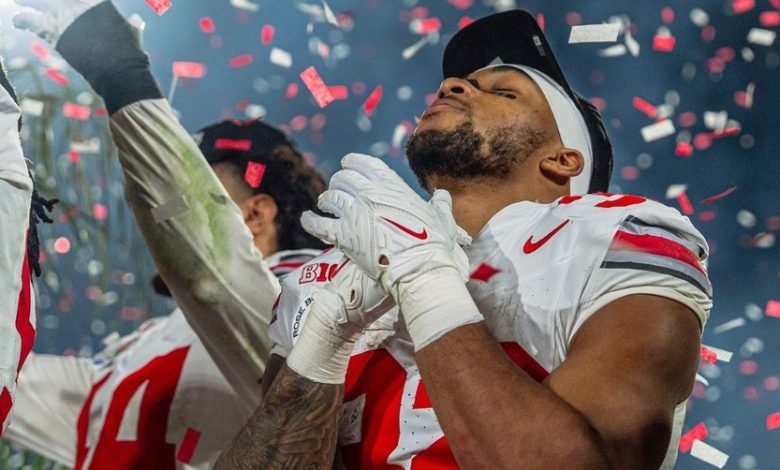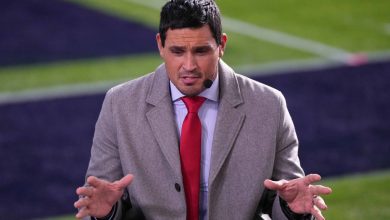Mailbox: What’s wrong with Ohio State football players promoting religious beliefs?

In recent years, discussions about the intersection of sports and religion have gained prominence, particularly as public figures, including athletes, use their platforms to share personal beliefs. This issue has become even more relevant in college football programs, where athletes are often not only playing for their universities but also serving as role models for young fans and future athletes. Ohio State University (OSU), one of the premier college football programs in the United States, has witnessed its players engaging in the promotion of religious beliefs both on and off the field. While many supporters view this as a positive use of their platform, others argue that it crosses ethical, legal, and moral lines. The complexities of this issue are multifaceted, touching on freedom of expression, the role of public universities, and the ethical responsibilities of athletes.
The Role of Athletes as Public Figures
Athletes in high-profile sports like football occupy a unique space in American society. Not only are they talented individuals showcasing their abilities on the field, but they also hold an incredible amount of influence over the public. This influence extends to various areas, including fashion, political views, and religious beliefs. College athletes, like those at Ohio State, are often under immense pressure to represent their university with integrity and professionalism. Their actions both on and off the field can have significant ramifications for the program, their personal lives, and, importantly, their community. Given their widespread visibility, the promotion of religious beliefs by athletes can be seen as an extension of their public persona.
The Right to Freedom of Expression
In the United States, freedom of expression is enshrined in the First Amendment to the Constitution, which guarantees individuals the right to express their beliefs without government interference. This protection extends to college athletes, including those at Ohio State University. They are entitled to share their religious views as long as they do not infringe upon the rights of others. As public figures, athletes have the right to use their platform to advocate for causes they believe in, including religion.
When Ohio State football players promote their religious beliefs, they are exercising their First Amendment rights. However, the question arises: should their status as athletes at a public university, funded by taxpayer dollars, place any limits on this expression? The debate centers around whether these players are using their platform for personal promotion, for the benefit of their religious views, or whether they are, in some instances, influencing vulnerable fans inappropriately.
The University’s Role and Public Funding
Ohio State University is a public institution, which means it is supported by taxpayer dollars. As such, it is bound by certain constitutional restrictions, particularly with regard to the separation of church and state. This principle ensures that the government does not endorse or promote any specific religious belief. Ohio State University, as an entity, must ensure that its actions, policies, and programming remain neutral on matters of religion. However, individual athletes at Ohio State are private citizens with their own beliefs, which complicates the situation.
When a player from Ohio State’s football team promotes religious beliefs, the university is not necessarily endorsing those beliefs. The athlete is exercising their personal freedom, but there are nuances regarding how this promotion happens. For example, if an athlete’s religious expressions are conveyed in a way that intersects with the university’s policies, such as using official team events or media channels to evangelize, the university may need to intervene to avoid the perception of endorsement. In such cases, the line between personal belief and public responsibility becomes increasingly blurry.
Potential Concerns and Ethical Considerations
1. Undue Influence on Young Fans and Players
One of the primary concerns about athletes promoting religious beliefs is the potential undue influence they may have on younger audiences, including fans and recruits. College athletes, especially those in major programs like Ohio State, are idolized by fans who see them as role models. For many of these fans, the actions of a player on or off the field can have a significant impact on their personal beliefs and attitudes.
While the promotion of religious beliefs is not inherently problematic, the fear arises when athletes use their position of power to pressure others into adopting their views. For example, if a player encourages fans to embrace a specific religion or implies that a lack of faith in that religion is unacceptable, it could be seen as coercive. This is particularly concerning when young people, still forming their own worldviews, look up to these athletes and may feel pressured to conform to their beliefs.
2. Team Dynamics and Diversity
College football teams are diverse spaces, made up of individuals from various backgrounds, cultures, and beliefs. Ohio State football is no exception, with players representing a wide range of faiths, including Christianity, Islam, Judaism, Hinduism, and those with no religious affiliation at all. Promoting one specific set of religious beliefs within such a diverse group could potentially create division, resentment, or feelings of exclusion. For some players, religious proselytizing may be seen as an overstep that disrupts team cohesion and unity.
Additionally, promoting religious beliefs can inadvertently marginalize those who do not share the same faith. College sports, at their core, are about teamwork and unity, and placing emphasis on any one player’s religious views may create friction within the locker room. If religion becomes a central aspect of team identity, it could lead to a lack of inclusivity and an uncomfortable atmosphere for players who do not wish to participate in religious discussions or practices.
3. Recruitment and Bias
Athletes at major college football programs like Ohio State are often influential during the recruitment process. High school athletes looking to join top programs may feel pressure to conform to the religious expectations or practices of a university or a particular player. This could create a biased environment, where athletes are chosen not just for their athletic abilities but for their adherence to specific religious beliefs. This raises the question of whether religious promotion in sports settings could contribute to an unfair or discriminatory recruitment process.
4. Balancing Personal Beliefs with Professional Responsibility
While players are entitled to their personal beliefs, they also have a responsibility as representatives of their university. Ohio State University, as an institution, seeks to maintain a professional image, especially in the world of college athletics. Coaches, staff, and administrators work tirelessly to ensure that the university’s brand and image remain intact. When players promote religious beliefs in a public-facing manner, it could be seen as inconsistent with the university’s responsibility to uphold its neutrality and professionalism. This creates a tension between personal freedom and the responsibility of representing a public institution.
Positive Aspects of Religious Promotion
While there are valid concerns about the promotion of religious beliefs in sports, there are also positive aspects to consider. Many athletes use their platforms to share messages of hope, love, and community, and religion can often be a source of strength for individuals facing challenges. For many football players, religion provides a moral framework that guides their decisions, shapes their character, and strengthens their resilience. When done thoughtfully, the promotion of religious beliefs can offer inspiration to fans and fellow athletes, encouraging positive personal growth and fostering a sense of community.
Moreover, in some cases, athletes who share their religious beliefs are also involved in charity work and outreach, using their fame to make a difference in the lives of others. This type of advocacy can have a profound impact, especially when it aligns with larger causes such as social justice, mental health awareness, or combating poverty. In these instances, promoting religion may not be about coercion but about creating a positive impact on the world.









